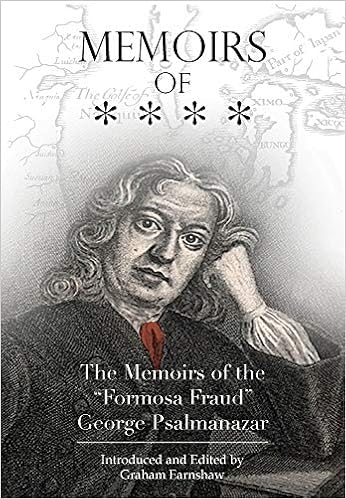I wish Johnson has written more about his Grub Street Years. So much about his character in his older, more settled years seems to stem from the unsettled years of hack writerdom. One thing we know is that Johnson made some friendships that seemed baffling to Boswell and those who knew him later. One glimpse at these lesser-known years is Johnson’s biography of Richard Savage, a friendship based on politics and poetry.
Another strange friendship was his one with George Psalmanazar. Indeed, Johnson describes Psalmanazar in ideal terms, describing him as the best man he’s ever met who “was so well known and esteemed, that scarce any person, even children, passed him without showing him signs of respect”. Johnson, in his later years, was a huge enemy of fraud, being of the team of experts being sent to uncover the truth of the Cock Lane Ghost and being a relentless doubter of the Ossian papers yet he speaks of the Formosan Fraud with nothing but glowing terms. Why is that?
I think the biggest clue to Johnson’s respect for Psalmanazar can be found in preface to the memoirs, a thirty page essay on redemption and the pursuit of a Godly life. It’s essentially a sermon and it reads a lot like Johnson’s writing. Psalmanazar uses the very Johnsonian technique of threes, putting three supporting points into a long sentence to create a full argument. The rhythms are like a Rambler essay with their very controlled movement between ideas. His use of alliteration, talking about ‘passions and prejudice’ sound like Johnson and he even does the classic Johnson move of using metaphors with strong verbs, like when he described life as ‘wading into a stormy sea.’ Honestly, the preface reads like vintage Johnson.
What’s more, the ideas are very Johnsonian. The beginning of the preface is about how he has been conducting his turn to God. He disputes the claim that such belief can be sustained on reason alone and that to follow a Godly life, there needs to be an element of faith as human reason is not strong enough to sustain it. This sounds very much like Johnson’s own doubts of the strength of human reason when faced with human passion and links to Johnson’s strong belief in hope and faith as a way to keep strong and good.
Psalmanazar talks about how making the decision to lead a good life and commit to God is a good one but making that commitment is the job finished. A person needs not to be complacent and to remain ever vigilant that they are continuing on the right path. This also seems like very Johnsonian advice, ever mindful of human weakness, he believed that a person should check on themselves periodically and keep relationships in good repair. Similarly, both Johnson and Psalmanazar would sit and write formal prayers on feast days, fast days and on days of personal significance.
Psalmanazar also talks about how he is to live in hope of redemption and strive for the best without the certainty that he’d done enough to fix the mistakes of his past. Johnson similarly was very concerned he might not have done to be in God’s good books and could only hope.
It could be that the two discussed religion and writing, it’s almost certain they did. Reading Psalmanazar’s preface it doesn’t seem impossible that he rubbed off on Johnson a little and that the younger Samuel took Psalmanazar’s example as he wrote his own works. The similarities could also be that they both were fans of similar work, both found William Law’s ‘A Serious Call to a Devout and Holy Life’ important in their religious development. For Johnson, who’d taken to mocking christianity in his teen years, it was the book that set him back on the path of Christianity and for Psalmanazar, it was the book that helped him turn a wish to change from his days as a fraud into practical action.
In my reading of Psalmanazar’s Memoirs, I expected the details of the fraud to be the part that most engaged me, however it was the second part, detailing his life in Grub Street that grabbed me more and also the preface - the preface is a mini marvel.



No comments:
Post a Comment